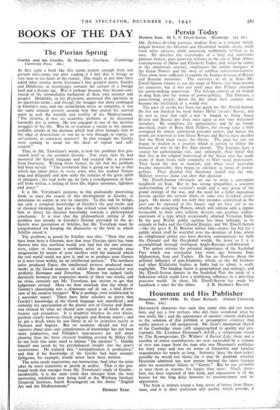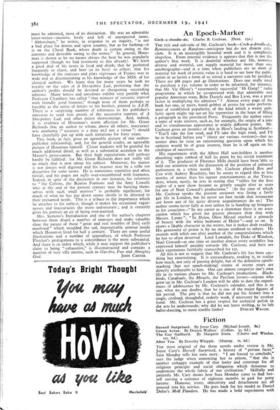Housman and His Publisher
HOUSMAN'S character was such that many who did not know him, and not a few perhaps who did, have wondered what he was really like ; and the appearance of another volume dedicated to the solution of this problem is presumptive evidence that public interest is still unappeased. Mr. Gow's marmoreal Sketch of the Cambridge years (still unapproached in quality and per- ception); Mr. Laurence Housman's A.E.H.; a symposium issued by The Bronasgrovian; Dr. Withers' A Buried Life; these and a number of minor contributions are now succeeded by a volume of over 50o pages from the man who was Housman's publisher for forty years and was on terms of friendship and familiar acquaintance for nearly as long. Intimacy (pace the dust-jacket) possibly he would not claim; for it may be doubted whether Housman admitted any new person beyond the inner barriers after his momentous failure in " Greats." But he was probably as near them as anyone, for longer than most. Much, there- fore, has been expected of this book, and expectation is all the keener for the long delay between its announcement and its appearance. The book is written round a long series of letters from Hous- man, and it is their profusion and quality which provide, it must be admitted, most of its distinction. He was an admirable letter-writer—incisive, lively and full of unexpected turns.
Abbotsbury," he writes, in response to an inquiry, " is not a bad place for downs and open country, but as for bathing—it is on the Chesil Bank, where death is certain owing to the currents and desirable owing to the stones." In general, Hous- man is shown as by no means always the bear he was popularly supposed (though we had testimony to this already). We learn a good deal of his tastes in food and drink; that he preferred burgundy to claret, and beer (at its best) to either; that his knowledge of the traiteurs and plats regionaux of France was as wide and as discriminating as his knowledge of the MSS. of his classical authors. We learn that for many years he took no royalty on the sales of A Shropshire Lad, preferring that the author's profits should be devoted to cheapening succeeding editions. Many letters and anecdotes exhibit very prettily what Professor Chambers has called " that mixture of sarcastic reproof with friendly good humour," though none of them perhaps so forcibly as the series of letters to his brother, printed in A.E.H. There is a surprising number of references to his publisher's omission to send him proofs of the successive reprints of A Shropshire Lad, and other minor shortcomings. And, indeed, it is evidence of Housman's warm affection for Mr. Grant Richards that an author to whom, above all others, inaccuracy was anathema (" accuracy is a duty ard not a virtue ") should have cheerfully put up with such irritations for forty years.
This hook, in fact, gives an agreeable picture of one author- publisher relationship, and, for the general reader, an agreeable picture of Housman himself. Closer students will be grateful for much additional detail, as well as a substantial accretion to the Master's prose-canon. But their high expectations will perhaps hardly be fulfilled: for Mr. Grant Richards does not really tell us much that is new about his subject. Moreover, his matter is not always well digested and his manner may be a trifle too discursive for some tastes. He is sometimes repetitive and often trivial; and his pages are sadly over-encumbered with footnotes. Indeed, in spite of the disclaimer in one instance, his reference to " the Colvins, the Buxton Formans and the Amy Lowells who at the end of the present century may be busying them- selves with such small matters " is probably significant; for much of what he has put down seems clearly to be directed to their presumed needs. This is a tribute to the importance which he attaches to his subject, though it makes his occasional vague- nesses and inaccuracies the more unfortunate ; and it certainly gives his portrait an air of being over-painted.
Mrs. Symons's Introduction and one of the author's chapters between them dispel a number of rumours and make valuably clear the nature of those " great and real troubles of [his] early manhood" which moulded the sad, impenetrable armour inside which Housman lived for half a century. There are some useful illustrations and a number of appendices, of which Professor Fletcher's prolegomena to a concordance is the most substantial. And there is an index which, while it may support the publisher's claim to being " exhaustive," is ill-constructed and contains a number of very silly entries, such as Gas-fire, Fun and Almighty























 Previous page
Previous page